(Corrected at 6:15pm, 4 Sept 2010)
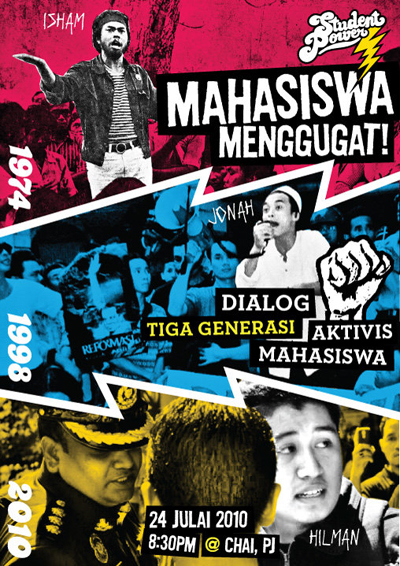
THE student movement in Malaysia was once vibrant, independent and autonomous. “Mahasiswa jurubicara rakyat” was the students’ motto in the 1960s. However, the government enacted the Universities and University Colleges Act (UUCA) in 1971 to restrict students’ freedom and their rising influence.
Thereafter, the student movement suffered a decline. Despite that, student activism remains alive in campuses even though it may not be as vibrant and united as in the 1960s. Three student activists from subsequent generations shared their experience at the Instant Café House of Arts and Ideas (CHAI) in Petaling Jaya on 24 July 2010.
Hishammuddin Rais, also known as Isham, was a prominent student leader in University of Malaya Students’ Union (Umsu) and the Socialist Club from 1971 to 1974. Khairul Anuar Ahmad Zainuddin, better known as Jonah, was the co-founder of Universiti Bangsar Utama (UBU) during the reformasi period in Malaysia which began in 1998. Hilman Idham is currently Kumpulan Aktivis Mahasiswa Independen (Kami) founder and president.
Below are excerpts of their sharing, translated from Bahasa Malaysia, at CHAI:
Hishammuddin Rais (Universiti Malaya, 1970s)
“I wanted to join the UM Socialist Club even before entering university. I registered with the club right after orientation and stood for election as a committee member of the 5th College in 1971. I failed but [it was okay] because I was a first-year student challenging a fourth-year medical student and I lost by 35 votes only.
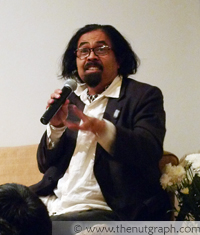
“You know we always tell a standard joke in the club, that we saw an advertisement in the library and thought we would be joining the social club and it would be a chance for us to meet women…[But] it’s not easy to join the Socialist Club. After you register, they’ll observe you and decide after a year whether you can be an official member. The majority of those who claimed to be a club member were actually just “ahli dalam pemerhatian”. I was active in Umsu in my second year so I wasn’t allowed to compete for any post in the Socialist Club.
“The Negeri Sembilan government withdrew my scholarship during my first-year because I was active in the student movement. That’s why I always called myself a part-time bumiputera. I never enjoyed the privileges as a bumiputera. In 1974, I was arrested by the police at 3am during the month of Ramadan for being involved in the protests by the urban poor at Tasek Utara (Johor).
“I was Umsu general-secretary at that time. I wasn’t afraid because I was confident that other varsity students would support me, and my student activist friends from Asean countries, New Zealand, Australia, Japan, Hong Kong…would back me. Real friendships are born when you’re struggling together [for a cause]. It’ll continue even after many years.”
(The government banned the Socialist Club and Umsu in 1974.)
(Corrected) Khairul Anuar Ahmad Zainuddin (Universiti Pertanian Malaysia & Institute Kemahiran Mara, late 1990s & early 2000s)
“My friends and I got involved in student activism ‘accidentally’. We were from different universities and got to know each other through theatre. Later we met each other again on the streets during the reformasi demonstrations. It was the first time we saw so many people on the streets protesting and we couldn’t help but wonder, why did close to 70,000 people take to the streets on 20 Sept 1998? Why?
“That was when we met Isham. He was like our sifu and shared with us his opinions about the reasons people were on the streets. Was it just to support (Datuk Seri) Anwar Ibrahim? Or was it because the rakyat was fed up with government oppression? That was when we started questioning and became politically and socially conscious.
“We started with Gerakan Mahasiswa Lantang Negara and then decided to set up UBU in Bangsar. At that time we were very innocent but spirited, we wanted to spread the meaning of ‘reformasi’ among the rakyat.
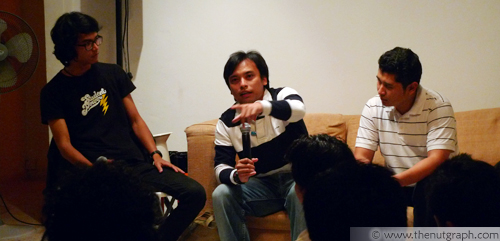
“UBU was a multiracial collective. We strongly believed that there was no difference among Malay, Chinese and Indians [Malaysians]. And that we’ve to defend the working class. We used theatre to spread our messages among the rakyat.
“We showed them images of state oppression and injustice, [including] police brutality, the situation in our courts, and how [the government] robs orang kampung of their land … (Corrected) Isham was the script writer, Zunar (Zulkifli Anwar Ulhaque) was producer and the rest of us were the actors. The theatre was our agitprop! It was a new approach and our production was later banned.
“Street protest was [also] an important [element] in our struggle. It was from there that we developed our confidence to fight for our rights, strengthen our solidarity, and learnt to understand the meaning of democracy. Every weekend we would have demonstrations at Central Market [and other places around KL]. We would wear a songkok or cap, and quickly changed into our spare t-shirt in the toilet after that to avoid arrest.
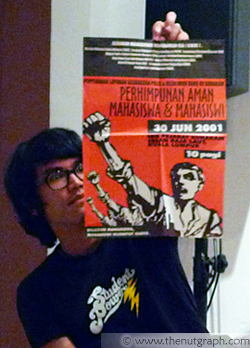
“[Apart from political activities], we also organised community projects and gave free tuition to kids of working class parents. It was successful and even non-UBU friends wanted to volunteer with us.
“I was arrested under the ISA when I accompanied the ISA 7 to the police station [in 2001]. I realised the true meaning of freedom when I was in solitary confinement. I cried on the first day and I understood why Isham ran away [when he knew he might be arrested].
“The police questioned me for hours every day. They asked me why I demonstrated, why didn’t I believe Anwar was involved in sodomy, why a Malay like me was campaigning in a Chinese temple and SJK (Cina) Damansara … I just made up stories sometimes. The detention strengthened my belief that the government was indeed a cruel one and we need to fight it till the end.”
(The former electrical engineering student is now Parti Keadilan Rakyat Youth vice-president.)
Hilman Idham (Universiti Kebangsaan Malaysia or UKM, 2000s)
“I was exposed to political issues since I was young. I remember following my dad to ceramah and all. When I entered university [and studied political science], I was exposed to different political perspectives and ideas. I remember one day during a lecture, a lecturer came in and asked ‘Apa sal you orang duduk dalam kelas? Tak pergi demo kah?’ This lecturer later inspired us to set up a political science club in UKM.
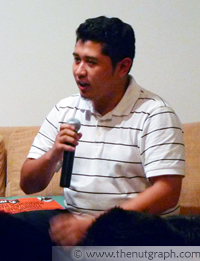
“We didn’t get involved with the Islamic student groups because we weren’t interested with the programmes they were organising. It was usually about marriage, prayers, puasa … We wanted to talk about political and economic issues, so we started Diskopi, later more people joined us and we set up Kami.
“Our main focus is to raise the level of political and social consciousness among university students. We went through the process of ‘pembodohan’ since we were young due to our education system. We were taught [only] what the people in power wanted us to know.
“And this dumbing-down process continued even after we entered university. Everything — from our class schedule to what activities we can run — is decided by the university [administration] on our behalf. We aren’t trained to [think] and make decisions on our own. [And yet] many of us are expected to be leaders when we enter society.
“I think the most important thing for us now is to free our university students from this process of pembodohan.”
(Hilman is also one of the four UKM political science students who are currently being charged under the UUCA for observing the Hulu Selangor by-election.) ![]()
[related-posts]
The Nut Graph needs your support


xianzai says
The restrictions make the grade of university students dull. Most of them have [little to no] interests in current affairs. And some of them don’t read the news every day.